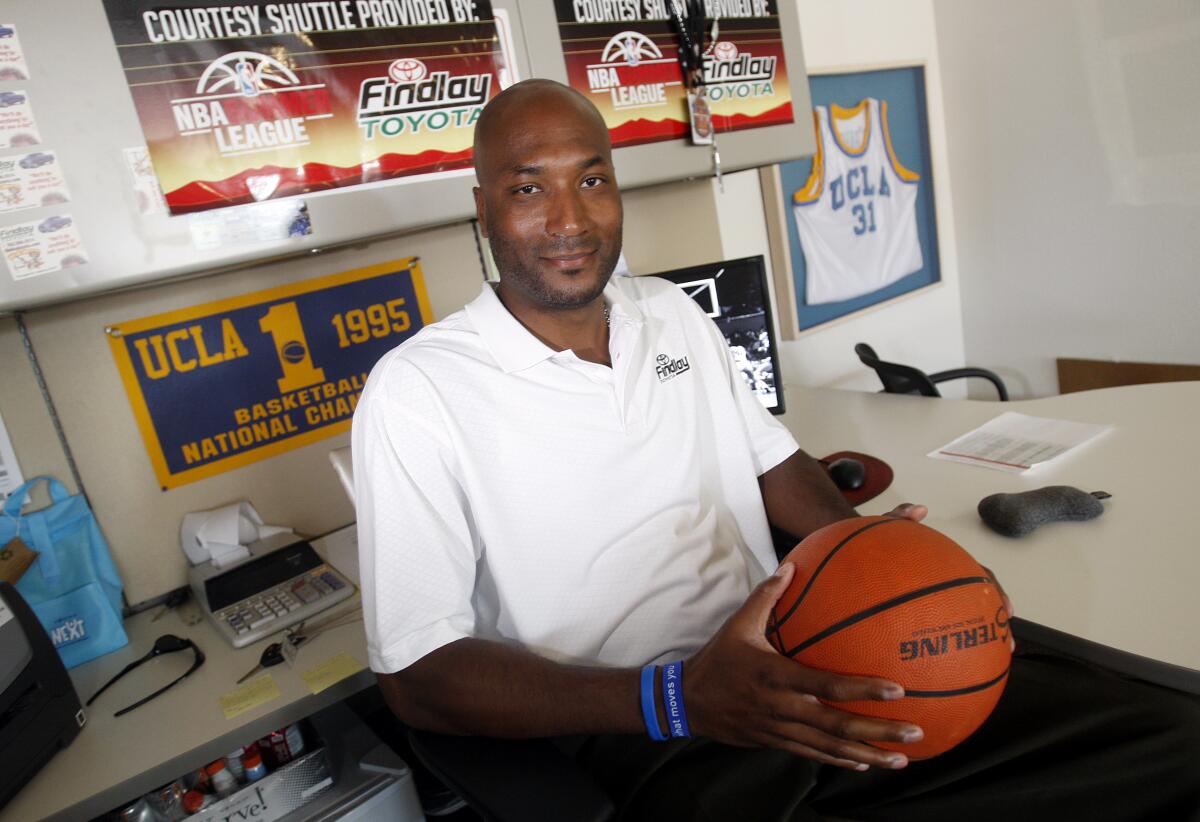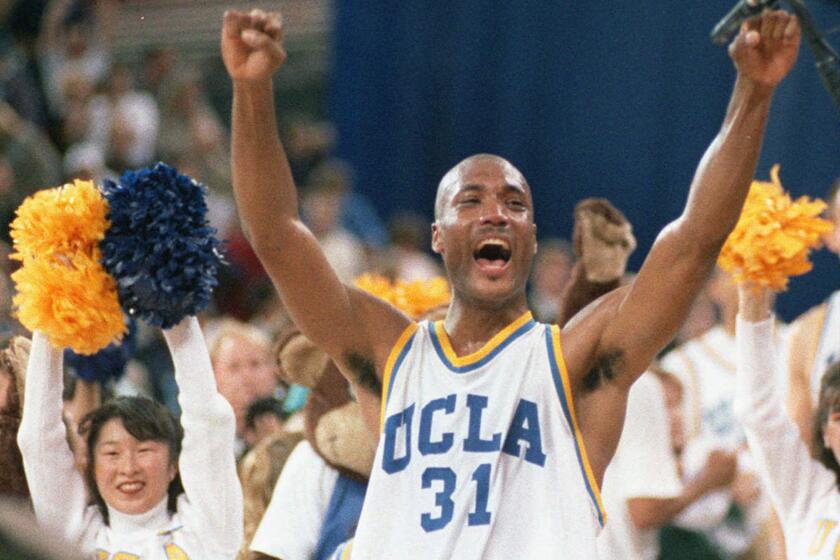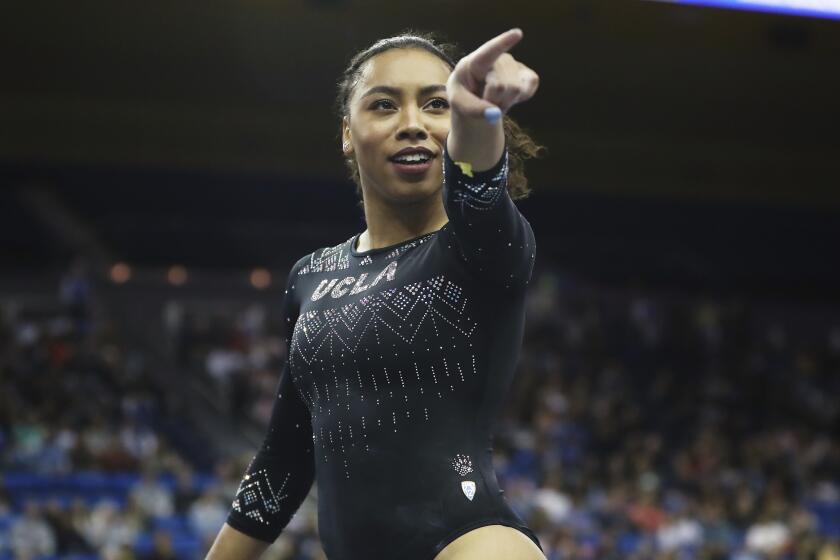Ed O’Bannon: LeBron James helped me find closure in my battle with NCAA

- Share via
Former UCLA basketball player Ed O’Bannon sued the NCAA in 2009 over name, image and likeness rights. He recently gave writer J. Brady McCollough a first-person account of his reaction to recent events that have led to college athletes being compensated for their fame.
LeBron James didn’t call me directly, but, as they say in Hollywood, his people called my people. So my wife and I drove out to Los Angeles. I had been a fan of his show and had watched “The Shop” a number of times prior to me going on. I was familiar with how it works, and I knew that Gov. Gavin Newsom was going to be a part of it. My goodness, it was an absolute blast, an honor, something I will never forget. Someone of LeBron’s ilk and prestige, to reach out to me? I hadn’t been on that big of a stage in a long, long time.
Honestly, that was one of the bigger moments of my career, of my life, because it really kind of let me know that what we did as far as the O’Bannon v. NCAA lawsuit was concerned, had meaning. Not necessarily meaning to college athletes, but to people in general. It let me know that folks really paid attention.
I had been just living my life since the trial. I can’t ramble off stats about what is going on with state laws and name, image and likeness, but I have been following from a distance, and that was on purpose. My wife, Rosa, and I decided we had our time wanting to bring about change, to start the conversation on NIL, but at the same time, for us, life goes on. We wanted to let someone else take the baton and run with it.
College athletes are about to be compensated for their fame because of a movement started in California by Nancy Skinner, Ed O’Bannon and others.
The lawsuit was pretty taxing those five years. If I were just a single man, if I wasn’t married with kids, it wouldn’t have been such a big deal. But the fact my kids saw a lot of the vitriol and hatred towards me, that in itself was taxing and hard. My wife and I knew what we were getting into. It wasn’t like I thought everybody was going to love us for doing this. But my kids were old enough to be on social media and to have friends on social media, and it was in their faces all the time. These critics were people that I don’t know and don’t know me, and I honestly didn’t think they knew exactly what we were trying to accomplish with the lawsuit. But folks had to direct their hatred somewhere, and I was the lead plaintiff, so they came towards me.
In the years after the trial, it almost felt like we were on a treadmill, kind of running in place, and I just felt like a huge part of the turn was LeBron. Once he voiced his opinion about the lawsuit and the whole situation, it was a turning point. He didn’t have to because he had nothing to do with college, went directly from high school to the NBA. My face was on this issue, but he put a more familiar face and obviously a bigger name to the situation. The fact he lent himself to what we were trying to accomplish was gigantic.
“It’s their lives, and whether they know what we did prior to them getting their contracts makes no difference to me. I will watch from a distance.”
— Ed O’Bannon
He spoke up not only for athletes on the men’s side but women as well. Diana Taurasi was there at the show and Katelyn Ohashi, a sweetheart of a young lady. Diana talked about how she was a fan of mine. I was a fan of hers at UConn. I had no idea she even knew my name. She walked up to me and Rosa and gave me a whole lot of love. I told her that next to Cheryl Miller and Lisa Leslie, you’re my favorite basketball player of all time. It was such a treat to be there among athletic royalty, all in one room, and they were there because of something that we started.
It was a surreal experience, and I think it brought closure. Rosa and I, when we drove off after the show, we were like, you know what, a period has been stamped on our involvement in this lawsuit and just the whole movement. We were very satisfied that, again, the baton has been passed. The support that everyone gave at that moment solidified what we had been trying to accomplish for over a decade.
UCLA plans to leverage ties to Hollywood and talent agencies to help athletes capitalize on NCAA name, image and likeness rules that go into effect July 1.
Now, I’m a juvenile probation officer for Clark County in the Las Vegas area. I’ve been doing it for three years and absolutely love it. For me, whether they are college athletes or youth in the neighborhoods we live in, my passion is to be involved with the lives of youth and to make a difference. In 2011, I was thinking about being a college coach, but I almost felt hypocritical as far as the lawsuit and coaching college sports. It just didn’t match up to me. I got my degree because I promised my mom I would and my first job was teaching eighth-grade geography. Then this opportunity to be a juvenile probation officer presented itself, and I jumped on it. They say if you’re doing something you love to do, you don’t call it work, and that’s really how I see this.
I know people are excited for college athletes to be able to use their NILs. I’ll keep up, check them out and see what they’re doing, but again, my job is done. I don’t want to be a part of it. There’s no big celebration planned, any of that stuff. It’s their lives, and whether they know what we did prior to them getting their contracts makes no difference to me. I will watch from a distance. I just hope everybody is happy.
More to Read
Go beyond the scoreboard
Get the latest on L.A.'s teams in the daily Sports Report newsletter.
You may occasionally receive promotional content from the Los Angeles Times.












